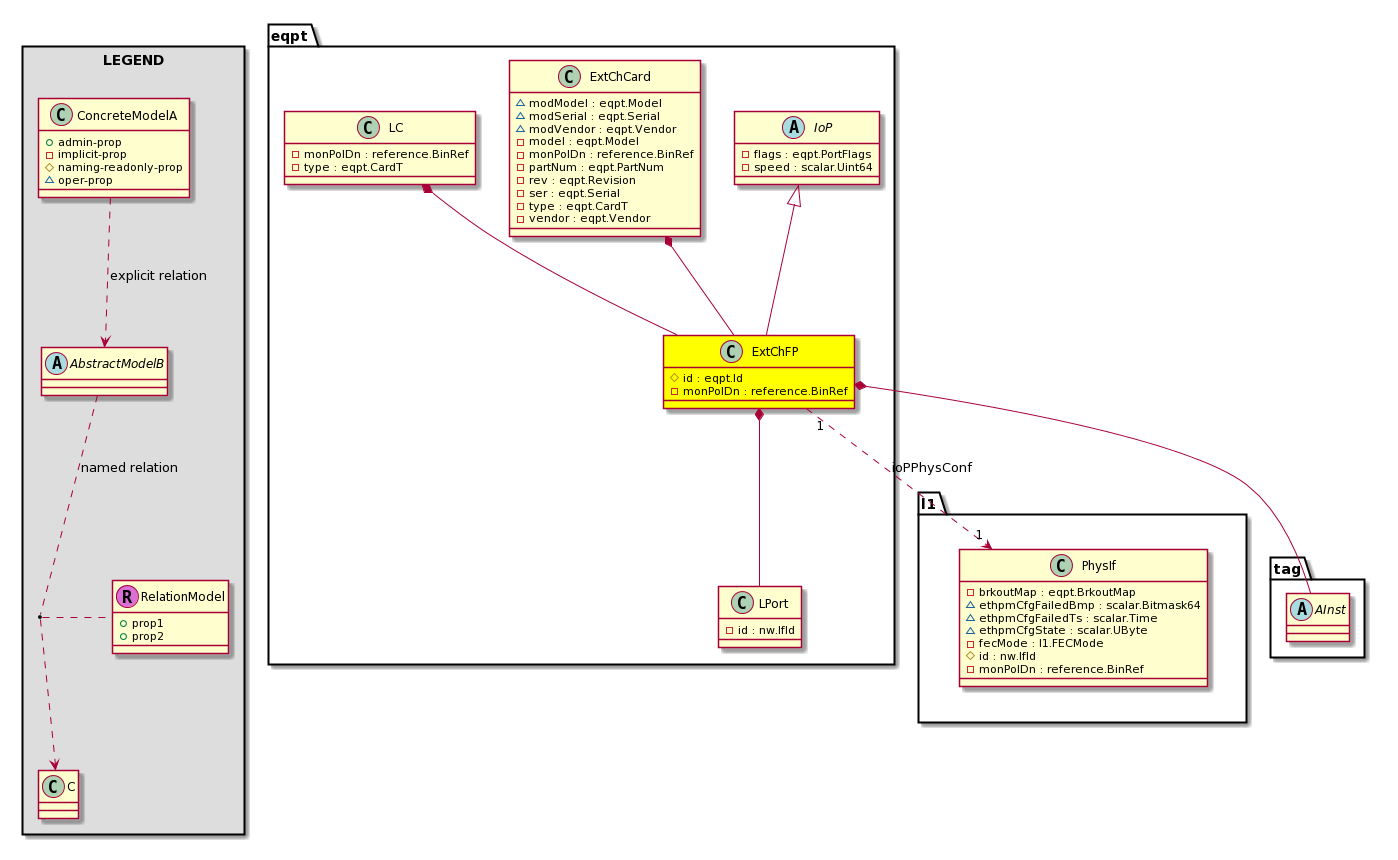| Properties Summary |
childAction
Type: mo:ModificationChildAction
Primitive Type: scalar:Bitmask32
Units: null
Encrypted: false
Access: implicit
Category: TopLevelChildAction
Comments:
-
Delete or ignore. For internal use only.
| |
| Constants |
| deleteAll |
16384u |
deleteAll |
NO COMMENTS
|
| ignore |
4096u |
ignore |
NO COMMENTS
|
| deleteNonPresent |
8192u |
deleteNonPresent |
NO COMMENTS
|
| DEFAULT |
0 |
--- |
This type is used to
|
|
descr
Type: naming:Descr
Primitive Type: string:Basic
Like: naming:Described:descr
Units: null
Encrypted: false
Access: admin
Category: TopLevelRegular
Comments:
-
Additional descriptive information about the object.
dn
Type: reference:BinRef
Units: null
Encrypted: false
Access: implicit
Category: TopLevelDn
Comments:
-
A tag or metadata is a non-hierarchical keyword or term assigned to the fabric module.
extMngdBy
Type: mo:ExtMngdByType
Primitive Type: scalar:Bitmask32
Units: null
Encrypted: false
Access: implicit
Category: TopLevelRegular
Comments:
-
True is Mo is managed by external orchestrators.
| |
| Constants |
| undefined |
0u |
undefined |
NO COMMENTS
|
| msc |
1u |
msc |
NO COMMENTS
|
| DEFAULT |
undefined(0u) |
undefined |
NO COMMENTS
|
|
flags
Type: eqpt:PortFlags
Primitive Type: scalar:Bitmask32
Units: null
Encrypted: false
Access: implicit
Category: TopLevelRegular
Comments:
-
The IP address flags.
| |
| Constants |
| brkout |
1u |
Breakout |
Breakout enabled
|
| DEFAULT |
0 |
--- |
Port flags
|
|
id
Type: eqpt:Id
Primitive Type: scalar:Uint32
Overrides:eqpt:Port:id | eqpt:Cont:id | eqpt:Item:id
Units: null
Encrypted: false
Naming Property -- [NAMING RULES]
Access: naming
Category: TopLevelRegular
Comments:
-
modTs
Type: mo:TStamp
Primitive Type: scalar:Date
Units: null
Encrypted: false
Access: implicit
Category: TopLevelRegular
Comments:
-
The time when this object was last modified.
| |
| Constants |
| never |
0ull |
never |
NO COMMENTS
|
| DEFAULT |
never(0ull) |
never |
NO COMMENTS
|
|
monPolDn
Type: reference:BinRef
Units: null
Encrypted: false
Access: implicit
Category: TopLevelRegular
Comments:
-
The monitoring policy attached to this observable object.
rn
Type: reference:BinRN
Units: null
Encrypted: false
Access: implicit
Category: TopLevelRn
Comments:
-
Identifies an object from its siblings within the context of its parent object. The distinguished name contains a sequence of relative names.
speed
Type: scalar:Uint64
Units: null
Encrypted: false
Access: implicit
Category: TopLevelRegular
Comments:
-
The operational speed in bytes.
status
Type: mo:ModificationStatus
Primitive Type: scalar:Bitmask32
Units: null
Encrypted: false
Access: implicit
Category: TopLevelStatus
Comments:
-
The upgrade status. This property is for internal use only.
| |
| Constants |
| created |
2u |
created |
In a setter method: specifies that an object should be created.
An error is returned if the object already exists.
In the return value of a setter method: indicates that an object has been created.
|
| modified |
4u |
modified |
In a setter method: specifies that an object should be modified
In the return value of a setter method: indicates that an object has been modified.
|
| deleted |
8u |
deleted |
In a setter method: specifies that an object should be deleted.
In the return value of a setter method: indicates that an object has been deleted.
|
| DEFAULT |
0 |
--- |
This type controls the life cycle of objects passed in the XML API.
When used in a setter method (such as configConfMo), the ModificationStatus
specifies whether an object should be created, modified, deleted or removed.
In the return value of a setter method, the ModificationStatus indicates the actual
operation that was performed. For example, the ModificationStatus is set to "created"
if the object was created. The ModificationStatus is not set if the object was neither
created, modified, deleted or removed.
When invoking a setter method, the ModificationStatus is optional:
If a setter method such as configConfMo is invoked and the ModificationStatus
is not set, the system automatically determines if the object should be created or modified.
|
|
type
Type: eqpt:PortT
Primitive Type: scalar:Enum16
Units: null
Encrypted: false
Access: implicit
Category: TopLevelRegular
Comments:
-
The type.
| |
| Constants |
| unknown |
0 |
Unknown |
Invalid port type
|
| eobc |
1 |
EOBC |
Internal EOBC port
|
| mgmt |
2 |
Management Port |
Management port
|
| fab |
3 |
Fabric Port |
Fabric port
|
| leaf |
4 |
Access Port |
Front panel port
|
| extchhp |
5 |
Extended Chassis Host Port |
Extended chassis host port
|
| extchfp |
6 |
Extended Chassis Fabric Port |
Extended chassis fabric(uplink) port
|
| DEFAULT |
unknown(0) |
Unknown |
Invalid port type
|
|

